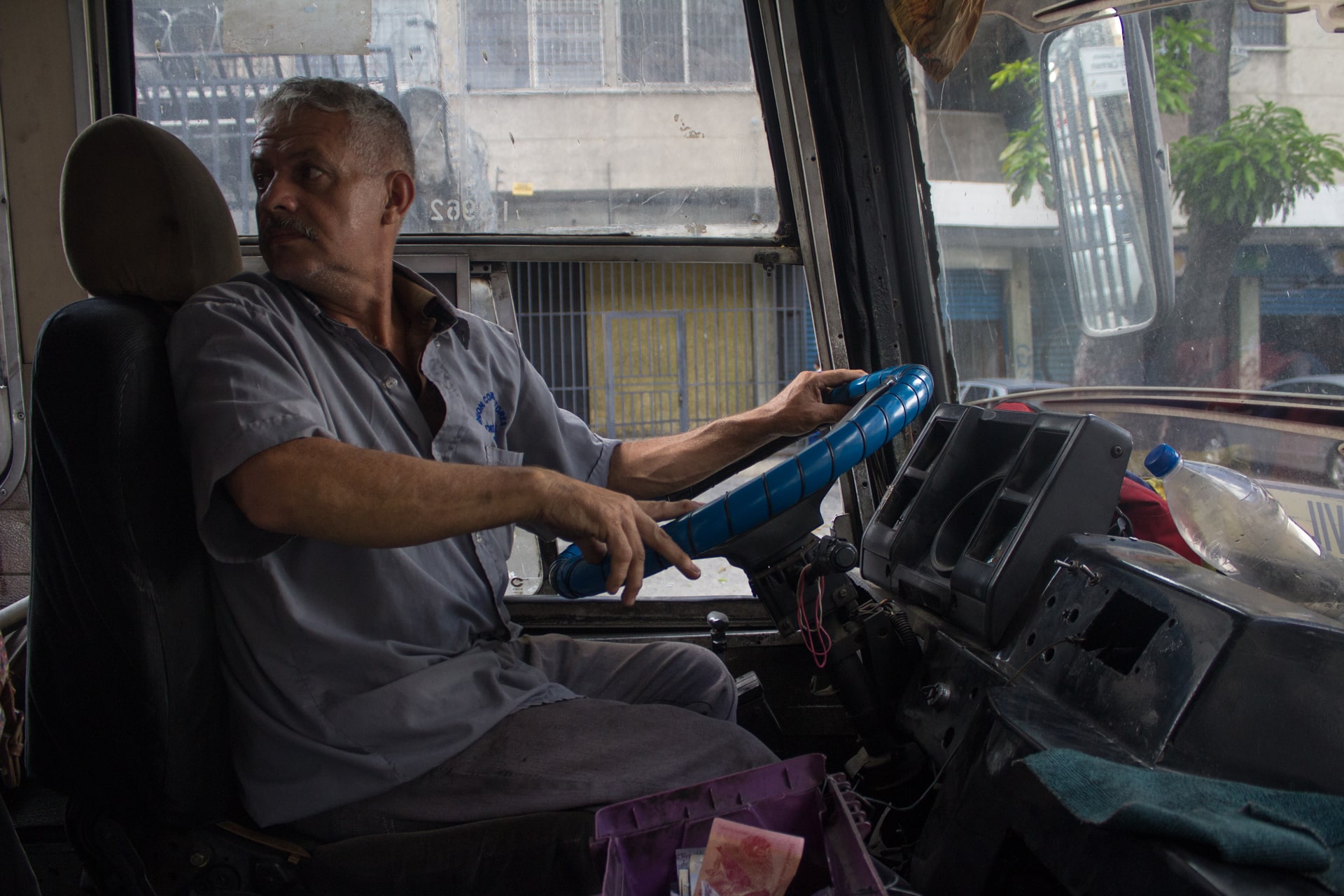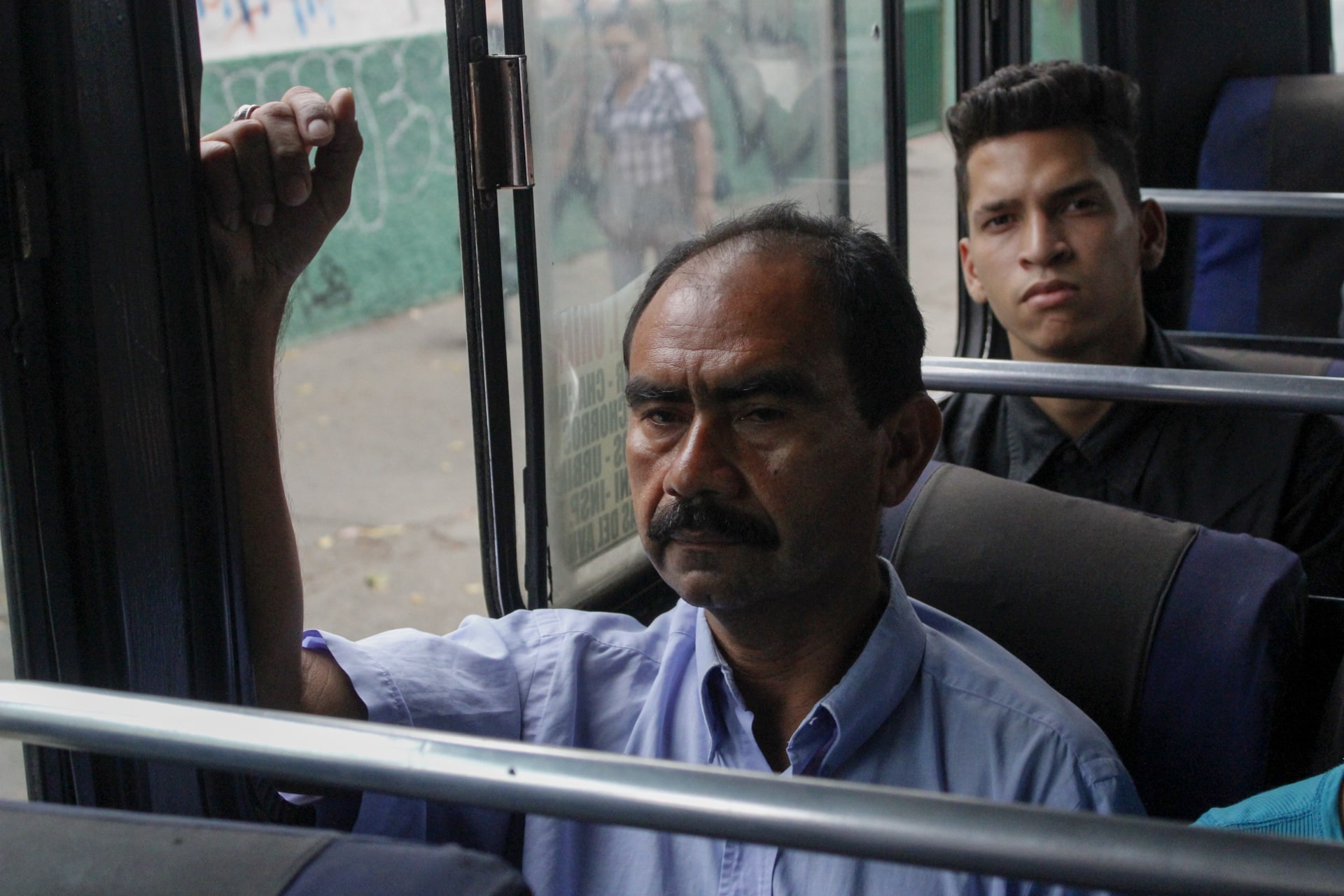BusTV: Culture Jamming Censorship One Bus at a Time
How do you let people know what’s going on amid the censorship raj? We do it on public transport, with a cardboard cut-out TV screen and a YouTube channel, to the beat of salsa.


Photos: Carlos Bello
You can jam up to 40 people in the tiny busses that ply the streets of Caracas, and you run into all kinds of everyone there: folks running their errands, others going to work or school. They all wait between one stop and the next; sitting, standing or clinging to the doors of the bus. While they wait, they listen to us read the news, brief pills of information that nobody was asking or looking for, but found their way to their route.
“Good afternoon. This is the early edition of the BusTV newscast.”
BusTV was born in 2017 amidst the protests. We wanted to let people know what was happening. The demonstrations broke off, but our passion is greater than ever amid continued censorship, media crackdowns and citizen rights violations. Today, we report to more than 3500 people a month, and count with 8 teams of reporters in the Capital District, Carabobo and Mérida.
 Many drivers don’t charge us anything as a small contribution to our work.
Many drivers don’t charge us anything as a small contribution to our work.
In just six minutes, we report all kinds of news: politics, the economy, culture, sports. We also share solutions; food tips are always wonderfully well received by the audience. It doesn’t matter how many go to bed without eating or that prices double every 17 days because of inflation. People experience the crisis everyday when they pay for the bus ride or when they buy flour. They want to know what to do about it, how to deal with it. Hunger is always present, regardless of whether oil prices go up or down.
“A tire for this bus costs around Bs.S. 40,000, that is, Bs.F. 4,000,000,000. To buy it, the driver would have to pick up approximately 40,000 passengers…”
We get on the bus. We ask the driver to allow us to read the day’s news. “The news?” some of them ask, curious. “Yeah, the news,” we answer and ask them to turn down the volume of the salsa brava that plays in the background. “Well, read it quickly, ‘cause I’m working.” “It’s ok, as long as you don’t talk about politics.” “Of course, that way people get the information, let’s see if they wake up.” Many drivers don’t charge us anything as a small contribution to our work.
“Over a million Venezuelans have emigrated to Colombia in 2018, according to an official statement by the Colombian Immigration Office…”
 Some people stand up to get a better look through the crowded bus. We read and people comment among themselves, muttering.
Some people stand up to get a better look through the crowded bus. We read and people comment among themselves, muttering.
Heads turn to the center of the aisle. Some people stand up to get a better look through the crowded bus. We read and people comment among themselves, muttering. An old man on the back yells “that’s a lie!” and a lady near the door tells him to keep quiet because she wants to listen to the news. The discussion continues and the newscast rolls on. Our cardboard TV frame protects us, puts us in a distant dimension. We are a moving TV, rooted in the center of the bus, with a show that goes on no matter what people say.
A man talks loudly over his phone, looking at the window, distracted. An old lady beside him turns and stares at him. The guy turns his head and finds black eyes looking at him. There’s a short staredown, the lady widens her eyes even more and twists her lips. “Hey, talk to you later, I’m on a bus,” the man whispers and the lady triumphantly returns to the news.
In the queues in bus stops, people cover their faces with towels, umbrellas, pieces of cardboard and folders. Their caps aren’t enough to shield them from the scorching midday sun, neither is the tree in the corner that offers a cool shadow for a piece of the line that keeps getting longer up the street. The jeeps should be moving down that road but they don’t, and people wait one, two, three hours as life passes. People cover their faces, not just from the sun but from the camera that’s recording the BusTV session in the bus stop.
“We’re in a dictatorship. You should say that, why don’t you? Surely you support the government.” The woman’s voice reverberates across the street and stays with us as we finish our report. “This bus is chavista. You can only report news about Chávez here.” The fare collector laughs and climbs off the bus to welcome us, wanting to know about today’s news, which of us is going to do the reporting that day and when are we going to be on TV. He tells us we should also interview him. The conversation breaks off with a “Pay up, please,” as a woman tries to get on the bus. “How are the Bus girls?” is a common thing when a driver or a bus stop manager sees us with our cardboard TV frame and our script, promptly announcing “Here come the news!”
We’re always in groups of three: One to hold the TV frame, another to read the news and a third to record the journey. That’s how we roll in Caracas, Valencia and Mérida on any bus stop or line, under sun or rain, during rush hour. People cheer when the newscast ends and we hear a few threats too. Three weeks ago in Antímano, a young man told us to stop doing this, that it’s good and it benefits the community, but that journalists who tell the truth are being closely watched. It’s true, we’re fairly visible, but this isn’t necessarily frightening. It’s an act of resistance which earned us a nomination for the Sixth Edition of the Gabriel García Márquez Award for Journalistic Innovation; we seek to light the torch in the darkness, one bus stop at a time, with a fundamental manifesto in mind: we don’t wait for the audience to come to us, we go to where they are.
“Meanwhile, lines for gas, bread and fuel continue. This was El Bus TV. Thank you very much for your attention. We’ll be back with more information.”
Caracas Chronicles is 100% reader-supported.
We’ve been able to hang on for 22 years in one of the craziest media landscapes in the world. We’ve seen different media outlets in Venezuela (and abroad) closing shop, something we’re looking to avoid at all costs. Your collaboration goes a long way in helping us weather the storm.
Donate




